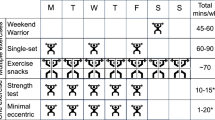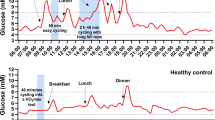Abstract
Effects of a carbohydrate beverage on the physiological responses to load carriage were examined. Ten fit male participants (age: 28 ± 9 years, body mass: 81.5 ± 10.5 kg, \( \dot{V} \)O2max: 55.0 ± 5.5 mL kg−1 min−1) completed two test conditions in random order, walking on a treadmill (6.5 km h−1) for 120 min, carrying a 25-kg backpack. At 0 and 60 min of exercise participants consumed 250 mL of a placebo (flavoured water) (PLA) or 6.4% carbohydrate (CHO) beverage. There were no differences in \( \dot{V} \)O2, respiratory exchange ratio (RER), heart rate or EMG activity of m. rectus femoris, m. vastus lateralis, m. semitendinosus and m. biceps femoris between conditions at minute 5 of exercise. The increase in \( \dot{V} \)O2 between minutes 5 and 120 was less during CHO than PLA (8 ± 5 vs. 14 ± 6%, P = 0.036). RER decreased during PLA, from 0.96 ± 0.05 at minute 5 to 0.87 ± 0.04 at minute 120 (P < 0.001), but not during CHO (P = 0.056). Heart rate increased between minutes 5 and 120 during PLA (16 ± 10%, P < 0.001) and CHO (12 ± 6%, P < 0.001), with no difference between conditions (P = 0.251). EMG peak RMS did not change between minutes 7 and 107 during PLA or CHO for the leg muscles. However, individual responses in EMG were highly variable (i.e. both increases and decreases in RMS). It was concluded that carbohydrate intake during load carriage reduced the \( \dot{V} \)O2 drift, which could be partially attributed to higher carbohydrate oxidation rates. Despite muscle fatigue/damage previously being identified as a cause of \( \dot{V} \)O2 drift, it appears that carbohydrate had no effect on neuromuscular responses during load carriage.




Similar content being viewed by others
References
Blacker SD, Fallowfield JL, Bilzon JLJ, Willems MET (2009) Physiological responses to load carriage during level and downhill treadmill walking. Med Sport 13:116–124
Blacker SD, Williams NC, Fallowfield JL, Bilzon JLJ, Willems MET (2010) Carbohydrate vs protein supplementation for recovery of neuromuscular function following prolonged load carriage. J Int Soc Sports Nutr 7:2
Bobet J, Norman RW (1982) Use of the average electromyogram in design evaluation. Investigation of a whole-body task. Ergonomics 25:1155–1163
Borg GA (1982) Psychophysical bases of perceived exertion. Med Sci Sports Exerc 14:377–381
Brisswalter J, Hausswirth C, Vercruyssen F, Collardeau M, Vallier JM, Lepers R, Goubault C (2000) Carbohydrate ingestion does not influence the change in energy cost during a 2-h run in well-trained triathletes. Eur J Appl Physiol 81:108–113
Byrne C, Lim CL, Chew SA, Ming ET (2005) Water versus carbohydrate-electrolyte fluid replacement during loaded marching under heat stress. Mil Med 170:715–721
Clarke HH, Shay CT, Mathews DK (1955) Strength decrements from carrying various army packs on military marches. Res Q 26:253–265
Coyle EF, Gonzalez-Alonso J (2001) Cardiovascular drift during prolonged exercise: new perspectives. Exerc Sport Sci Rev 29:88–92
Durnin JV, Womersley J (1974) Body fat assessed from total body density and its estimation from skinfold thickness: measurements on 481 men and women aged from 16 to 72 years. Br J Nutr 32:77–97
Hamilton MT, Gonzalez-Alonso J, Montain SJ, Coyle EF (1991) Fluid replacement and glucose infusion during exercise prevent cardiovascular drift. J Appl Physiol 71:871–877
Hargreaves M (2004) Muscle glycogen and metabolic regulation. Proc Nutr Soc 63:217–220
Howley ET, Bassett DR Jr, Welch HG (1995) Criteria for maximal oxygen uptake: review and commentary. Med Sci Sports Exerc 27:1292–1301
Ishijima T, Hashimoto H, Satou K, Muraoka I, Suzuki K, Higuchi M (2009) The different effects of fluid with and without carbohydrate ingestion on subjective responses of untrained men during prolonged exercise in a hot environment. J Nutr Sci Vitaminol (Tokyo) 55:506–510
Jeukendrup AE (2004) Carbohydrate intake during exercise and performance. Nutrition 20:669–677
Jeukendrup AE, Jentjens R (2000) Oxidation of carbohydrate feedings during prolonged exercise: current thoughts, guidelines and directions for future research. Sports Med 29:407–424
Jeukendrup AE, Wallis GA (2005) Measurement of substrate oxidation during exercise by means of gas exchange measurements. Int J Sports Med 26:S28–S37
Kirwan JP, Costill DL, Mitchell JB, Houmard JA, Flynn MG, Fink WJ, Beltz JD (1988) Carbohydrate balance in competitive runners during successive days of intense training. J Appl Physiol 65:2601–2606
Knapik J, Harman E, Reynolds K (1996) Load carriage using packs: a review of physiological, biomechanical and medical aspects. Appl Ergon 27:207–216
Lobb B (2004) Load carriage for fun: a survey of New Zealand trampers, their activities and injuries. Appl Ergon 35:541–547
Maughan RJ, Shirreffs SM, Leiper JB (2007) Errors in the estimation of hydration status from changes in body mass. J Sports Sci 25:797–804
Patton JF, Kaszuba J, Mello RP, Reynolds KL (1991) Physiological responses to prolonged treadmill walking with external loads. Eur J Appl Physiol Occup Physiol 63:89–93
Quesada PM, Mengelkoch LJ, Hale RC, Simon SR (2000) Biomechanical and metabolic effects of varying backpack loading on simulated marching. Ergonomics 43:293–309
Siri WE (1956) The gross composition of the body. Adv Biol Med Phys 4:239–280
Tsintzas K, Williams C (1998) Human muscle glycogen metabolism during exercise. Effect of carbohydrate supplementation. Sports Med 25:7–23
Warren GL, Lowe DA, Armstrong RB (1999) Measurement tools used in the study of eccentric contraction-induced injury. Sports Med 27:43–59
Acknowledgments
We would like to thank Dr Beverly Hale for her guidance of the statistical analysis.
Author information
Authors and Affiliations
Corresponding author
Additional information
Communicated by Jacques R. Poortmans.
Rights and permissions
About this article
Cite this article
Blacker, S.D., Williams, N.C., Fallowfield, J.L. et al. The effect of a carbohydrate beverage on the physiological responses during prolonged load carriage. Eur J Appl Physiol 111, 1901–1908 (2011). https://doi.org/10.1007/s00421-010-1822-y
Received:
Accepted:
Published:
Issue Date:
DOI: https://doi.org/10.1007/s00421-010-1822-y




